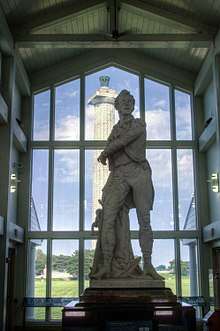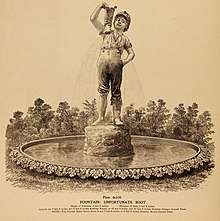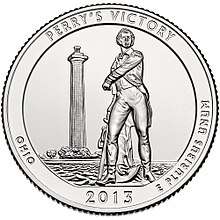William Walcutt
William Walcutt (April 28, 1819, Columbus, Ohio – April 22, 1882, New York City) was an American painter and sculptor, best remembered for the Perry Monument in Cleveland, Ohio.[1]

Biography
He studied in London in 1852, followed by two years in Paris studying painting with Adolphe Yvon and sculpture at the École Impériale et Spéciale des Beaux-Arts. He returned to the United States in 1854, and opened a studio in New York City.[2]
His most famous work is the Commodore Oliver Hazard Perry Monument (1860), that originally stood in the Public Square in Cleveland, Ohio.[3] The monument was relocated several times, and since 1991 has stood in Fort Huntington Park, beside the Cuyahoga County Courthouse.[4] His weathered marble statue of Perry was replaced with a bronze copy in 1928. A second bronze copy stands outside the Rhode Island Statehouse, in Providence, Rhode Island.[5] The original marble is now displayed inside the visitor center at the Perry's Victory and International Peace Memorial in Put-in-Bay, Ohio.[6] Walcutt's statue appears on the 2013 "Perry's Victory" quarter.[7]
His 1857 historical painting, Pulling Down the Statue of George III, is in the collection of Lafayette College in Easton, Pennsylvania.[8][9] Portraits of Taft family members by him are at the William Howard Taft National Historic Site in Cincinnati, Ohio.[10][11][12]
A Neoclassical statue by him, Musidora (marble, 1868), is in the High Museum of Art in Atlanta, Georgia. He may have modeled the original statue – possibly copied from a European source – for The Boy with the Boot, a zinc fountain sculpture that was patented in 1875 by J. L. Mott Iron Works of New York City. Mott mass-produced the statue into the 1910s (as The Unfortunate Boot); and other manufacturers continued production into the 1950s.[13] The example in Sandusky, Ohio, moved inside the City Building following vandalism in the 1990s, is credited to Walcutt.[14]
Walcutt's papers are at the Archives of American Art at the Smithsonian Institution.[15]
.png) Perry Monument (1860), Public Square, Cleveland, Ohio.
Perry Monument (1860), Public Square, Cleveland, Ohio.- Musidora (marble, 1868), High Museum of Art.
 The Boy with the Boot (c.1875).
The Boy with the Boot (c.1875). 2013 "Perry's Victory" quarter.
2013 "Perry's Victory" quarter.
References
- William Walcutt, from AskArt.
- Inauguration, p. 126.
- http://www.hmdb.org/Marker.asp?Marker=29592
- Perry Monument, from The Encyclopedia of Cleveland History.
- Oliver Hazard Perry, (sculpture), from SIRIS.
- Perry's Victory & International Peace Memorial, from Touring Ohio.
- Perry's Victory quarter, from United States Mint.
- Pulling Down the Statue of George III, from SIRIS.
- Pulling Down the Statue of George III, from Lafayette College.
- Alphonzo Taft, (painting), from SIRIS.
- Louise M. Taft, (painting), from SIRIS.
- Peter Rawson Taft, (painting), from SIRIS.
- Grissom, Carol (2009). "Boy with Leaky Boot". Zinc Sculpture in America: 1850–1950. Associated University Presses. pp. 330–333. ISBN 9780874130317. Retrieved 12 April 2016. Lists 33 current or former locations of the statue in the United States.
- Boy with the Boot (sculpture), from SIRIS.
- William Walcutt Papers, from Smithsonian Institution.
Sources
- Inauguration of the Perry Statue: at Cleveland, on the tenth of September 1860, (Cleveland City Council, 1860).
- Joseph T. Hannibal, "The Commodore Perry Statue: History and Weathering of Ohio's First Monumental Marble Sculpture," (March 2011).
| Wikimedia Commons has media related to William Walcutt. |
External links
- "William Walcutt". Find a Grave. Retrieved 2016-04-12.
- Commodore Perry, from Historic Perrysburg.